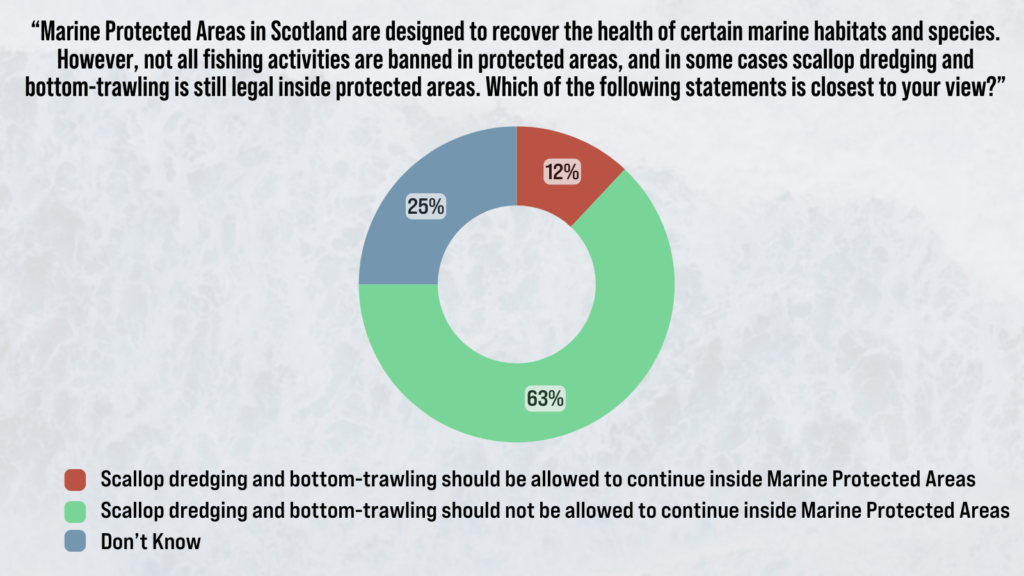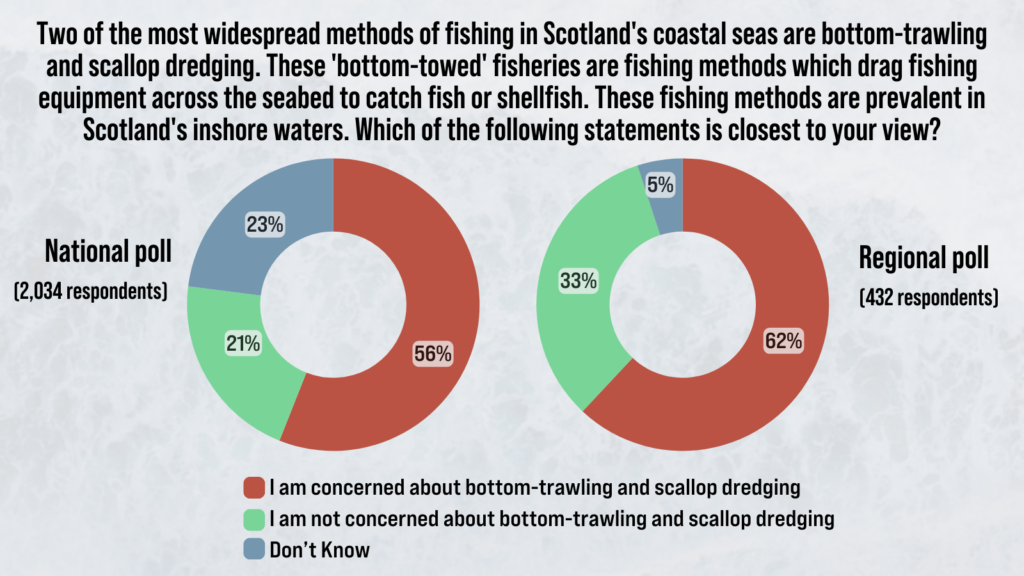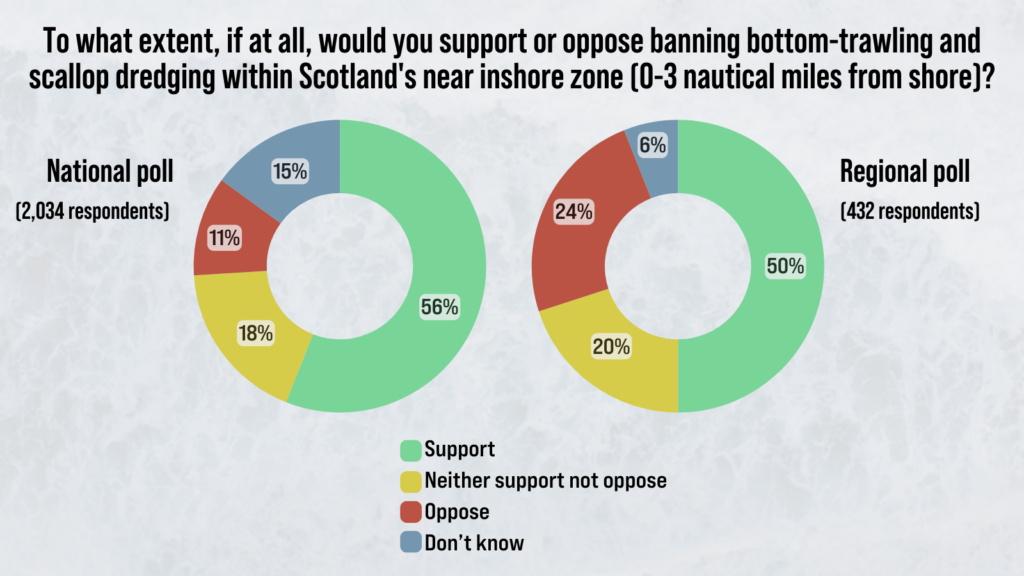A consultation on proposals to ban bottom trawling and scallop dredging in Scotland’s offshore Marine Protected Areas (MPAs) is closing on Monday (14th October) and a national survey indicates that most Scots want to see these damaging fishing practices banned in MPAs.
The survey consisting of 2,034 people living in Scotland aged 16+, found that 63% of respondents thought that scallop dredging and bottom-trawling should not be allowed to continue inside Marine Protected Areas. Of the remaining respondents, 25% were unsure, and only 12% thought these fishing practices should continue in these important habitats.

For years the Scottish Government has routinely committed to – and subsequently missed their deadline for – delivering fisheries management measures in our MPAs. The current consultation, which was launched in late August, only covers Scotland’s offshore MPA sites, with proposals to fully ban the use of demersal mobile gear in five offshore MPAs and options for either a full or partial ban at another 15.
Many see these latest proposals as a welcome step to finally seeing long-promised fisheries management in place for the Scottish MPA network, yet are eager to see similar plans announced for Scotland’s inshore MPAs and Priority Marine Feature (PMF) habitats.

Caitlin Turner
marine biologist & conservationistBottom trawling and dredging are fishing methods which involve dragging heavy fishing equipment across the seabed to catch fish or shellfish and have been linked to considerable environmental disturbance and bycatch of non-target species. The majority of respondents expressed concern about these fishing methods, with 56% responding that they were “concerned about bottom-trawling and scallop dredging” in the national poll. An even higher proportion (62%) expressed this view in regional polling from a selection of coastal towns and villages, including Campbeltown, Ullapool, Fraserburgh and Wick.

The majority of respondents also supported banning bottom trawling and dredging in Scotland’s inshore seas.

Polling from Our Seas coalition member Oceana also showed widespread public support for banning bottom-towed fishing in MPAs, with 81% of UK adults (83% of Scottish adults) saying bottom trawling should be banned in Marine Protected Areas.
It is not only the general public who support more sustainable fisheries management, but also the low-impact fishing industry and coastal communities who rely on positive marine environmental change.

Bally Philp
National coordinator for the Scottish Creel Fishermen’s Federation
David Nairn
Clyde Porpoise CICThe Our Seas coalition is urging the Government to roll out promised inshore marine management in order to recover important marine habitats and the coastal communities and inshore fishermen who rely on them.

Hayley Wolcott
coordinator of the Our Seas coalitionRespond to the consultation
The Scottish Government is currently consulting on proposals to ban bottom trawling and scallop dredging in Scotland’s Marine Protected Areas (MPAs). This consultation only covers Scotland’s offshore MPA sites, with proposals to fully ban the use of demersal mobile gear in five offshore MPAs and options for either a full or partial ban at another 15.
The government recognised the impact that bottom-towed fishing had on the features of the sites and started to develop proposal for fisheries management measures within them back in 2015. The ongoing delay of getting these proposals over the line has left these sites and important features at risk of damage for over ten years. Removal of bottom towed fishing through the whole MPA network is the bare minimum for MPA management and it’s about time that the government fulfilled their commitments.
You can help Scotland’s vital offshore marine habitats recover by responding to the Government consultation by 14th October calling for a full ban on bottom-towed fishing in all 20 offshore MPAs. For more information on the consultation and how to respond, check out these useful guides from Young Sea Changers Scotland and Scottish Environmental LINK. If you are short on time, Oceana UK and Scottish Environmental LINK are running e-actions which let you respond to the consultation in less than a minute.
Survation polling
The Our Seas coalition commissioned Survation to conduct a nationally representative survey of Scotland to investigate awareness of and attitudes towards Scottish fisheries management. This survey was supplemented by a regional poll of residents living in coastal communities in Scotland to explore the same issues. The rationale for this survey was to get insight on local and regional opinions of Scottish fisheries management issues which are not contained in official national statistics.
The Survation poll was conducted between December 2022 and January 2023. It consisted of national online survey of (2034 residents in Scotland aged 16+) and regional telephone survey focusing on coastal communities (432 residents aged 16+ of Campbeltown, Eyemouth, Fraserburgh, Kinlochbervie, Kirkcudbright, Lochinver, Oban, Portree, Stonehaven, Troon, Ullapool, and Wick).
Call for Inshore Recovery
Scotland’s inshore seas were once safeguarded by an inshore limit which banned bottom trawling within 3 miles of shore. For nearly a hundred years, this ‘three mile limit’ protected fish spawning and nursery grounds and the fishermen working close to shore. After years of overfishing offshore, industry lobbying saw the inshore limit to be repealed in 1984, allowing bottom-trawling within three miles of shore. Today bottom-trawling is allowed in 90% of our coastal seas, scallop dredging in 95%, including within Marine Protected Areas. Since the removal of the three mile limit, many fish stocks in these coastal waters have plummeted, causing drastic job losses and insecurity for fishermen around Scotland’s coast. Scotland’s seabed habitats are its greatest carbon sink, yet they have been reduced to a fraction of their historic extent.
We can once again have healthy inshore ecosystems that support productive, resilient fisheries. Sign our petition calling for a modern #InshoreLimit so we can build a better future for communities, fishermen, and the many who rely on a productive, diverse environment.
Leave a Reply